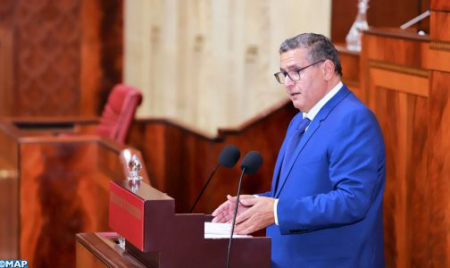Prime Minister Aziz Akhannouch highlighted Morocco’s recent economic success, particularly in tourism and remittances, during a parliamentary session on external trade’s role in the country’s development. As of September 2024, Morocco’s travel revenues reached an unprecedented 87.1 billion dirhams, marking an 8.4% year-over-year increase and a remarkable 44.7% growth compared to pre-pandemic levels in 2019. Morocco also set a new milestone in tourism arrivals, with 13.1 million visitors in the first nine months of 2024, a 2 million increase from 2023 and a 29% jump over 2019.
Akhannouch attributed this success to the government’s proactive tourism recovery plan and a fresh roadmap for sectoral growth. These measures have revitalized Morocco’s tourism, proving their effectiveness in driving record revenues and visitor numbers.
Additionally, remittances from Moroccans abroad have surged to record levels, surpassing 115 billion dirhams in 2023, up from 110 billion dirhams in 2022—a 4.1% increase. By September 2024, remittances had grown another 5.2%, reaching 91.5 billion dirhams. This steady rise reflects the diaspora’s robust support for the national economy, particularly during a time of global financial uncertainty.
The outsourcing industry has also shown impressive performance, generating 18 billion dirhams in exports in 2023, a 14% rise over the previous year. This growth positions Morocco as the second-leading outsourcing destination in Africa. According to Akhannouch, Morocco’s digital strategy is set to further accelerate offshoring activities, which will positively impact service exports, trade surpluses, and the balance of goods and services. Indeed, the trade balance surplus reached 133 billion dirhams in 2023, a significant increase from 116 billion in 2022, signaling a stable growth trend.
Thanks to these gains across tourism, remittances, and outsourcing, Morocco has significantly enhanced its coverage of imports by exports, which rose from 80.8% in 2019 to over 82.9% between 2023 and 2024, the highest level recorded since 2003. These achievements have also led to a historic reduction in Morocco’s current account deficit, which dropped to 9 billion dirhams in 2023, equivalent to just 0.6% of GDP—down from 43 billion dirhams (3.4% of GDP) in 2019.
Akhannouch credited these accomplishments to structural reforms enacted by the government, which have spurred production sector performance and increased imports by over 12% by the end of 2023. These measures have also helped reduce national debt from 72% to below 70% of GDP since the beginning of the current government term, reversing a trend of rising debt levels observed from 2011 to 2020.
The Prime Minister noted that Morocco’s positive fiscal trajectory and the government’s ongoing reforms have led to an improved sovereign credit rating and outlook. The government remains committed to strengthening these economic indicators and advancing Morocco’s sovereign rating with international agencies, which would further consolidate Morocco’s economic stability and appeal as an investment destination.
Foreign direct investment (FDI) in Morocco reached 16.3 billion dirhams by the end of September 2024, a remarkable 50.7% increase compared to the same period last year, announced Akhannouch. Akhannouch attributed this surge in FDI to Morocco’s attractiveness to international investors, enhanced by the government’s proactive New Investment Charter.
Among the standout projects contributing to Morocco’s investment appeal is the country’s first electric battery manufacturing ecosystem, requiring a substantial investment of 3 billion dirhams and set to generate over 2,500 jobs. This investment cements Morocco’s role in the green energy sector and builds on the government’s strategy to diversify its industrial landscape.
Akhannouch also highlighted a groundbreaking memorandum of understanding (MoU) with a global player to establish Africa’s first electric vehicle battery and energy storage plant in Morocco, a venture involving an investment of around 65 billion dirhams. Expected to create 25,000 direct and indirect jobs, this initiative reinforces Morocco’s leadership in the automotive industry and secures its position as a key hub for sustainable mobility in Africa.
Building on this momentum, Akhannouch noted that under the guidance of King Mohammed VI, the government remains committed to advancing the green hydrogen sector. To promote Morocco as a global leader in sustainable energy, the government has launched the “Morocco Green Hydrogen Offer,” a competitive package aimed at attracting investors with a comprehensive, transparent strategy. Since this initiative’s launch in March, the Moroccan Agency for Sustainable Energy (MASEN) has received nearly 40 proposals from across the globe, including countries in the Americas, Europe, Asia, and Australia, with interest heavily focused on Morocco’s Southern Provinces.
“This interest confirms the bright prospects of the green hydrogen sector in Morocco and reflects the strong confidence that both foreign and domestic investors have in this area,” Akhannouch stated, underscoring Morocco’s role as a top destination for sustainable investment.
Reflecting on the economic progress of recent years, Akhannouch emphasized that these achievements mark Morocco’s transformation towards a more resilient economy. However, he noted that the true challenge lies in maintaining and advancing this progress across strategic sectors. The government’s objective, he stressed, is to continue establishing a solid, sustainable foundation for Morocco’s external trade and industry, particularly in high-value sectors.
The Prime Minister concluded by emphasizing Morocco’s emergence as a model for FDI attractiveness. Since the start of the government’s term, he explained, clear priorities and programs have been set to develop the industrial sector, focusing on high-value-added industries. This approach, paired with significant green energy and technology projects, signals Morocco’s readiness to lead the region in sustainable development and economic growth.





